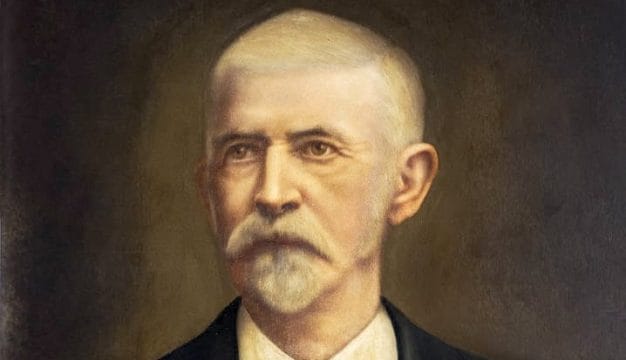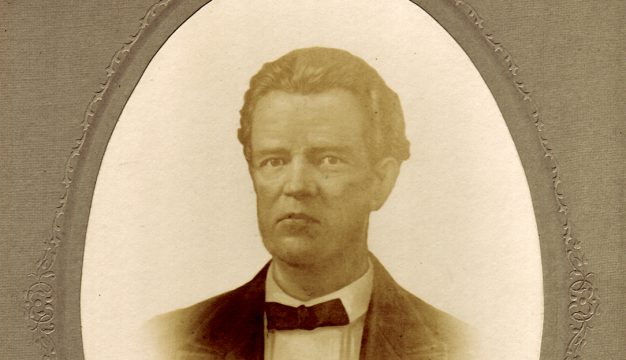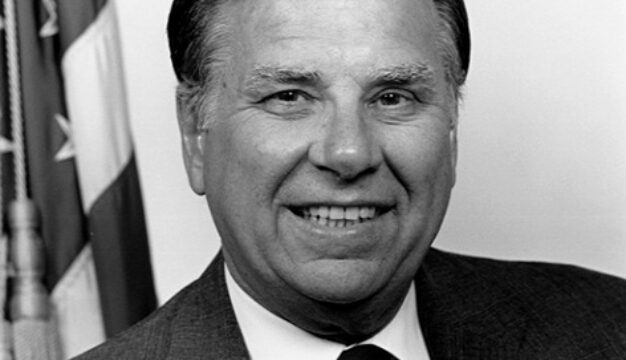James La Fayette Cottrell
James La Fayette Cottrell (sometimes James Lafayette Fletcher Cottrell, 1808-1885) represented Alabama's Third Congressional District for fewer than four months, from 1846-1847, but was a prominent state legislator in Alabama. He practiced law and grew wealthy operating a cotton plantation along the Suwannee River in Florida. After the Civil War, Cottrell served as a civil servant at Cedar Keys, Florida, and in the Florida State Senate for some 20 years until his death in 1885.
 James Cottrell and James McQueen
James La Fayette Cottrell was born on August 25, 1808, in King William County, Virginia, though some sources say Prince William County. Records on his parents are unclear, but they may have been James L. Cottrell and Lucy Wesley McQueen. Some sources say his father was an Englishman who served as a colonial naval officer in the American Revolution and who later became a Baptist minister. As the religious movement known as the Second Great Awakening spread across the country, Cottrell's family relocated to Georgia and then to Autauga County. Cottrell studied law in Washington, D.C., under William D. Pickett. After returning to Alabama in 1830, he set up his own practice in Hayneville, Lowndes County. At some point, he married Rachel Ann McQueen, the daughter of an early settler of Lowndes County who died around 1836. Cottrell later married her sister. Cottrell rose to prominence in the community and was elected to the Alabama House of Representatives in 1834, 1836, and 1837. Politically, Cottrell was a states' rights Democrat and would own large amounts of land and numerous slaves. He was elected to the State Senate from 1838-1841 and was elected as president of that body in 1840.
James Cottrell and James McQueen
James La Fayette Cottrell was born on August 25, 1808, in King William County, Virginia, though some sources say Prince William County. Records on his parents are unclear, but they may have been James L. Cottrell and Lucy Wesley McQueen. Some sources say his father was an Englishman who served as a colonial naval officer in the American Revolution and who later became a Baptist minister. As the religious movement known as the Second Great Awakening spread across the country, Cottrell's family relocated to Georgia and then to Autauga County. Cottrell studied law in Washington, D.C., under William D. Pickett. After returning to Alabama in 1830, he set up his own practice in Hayneville, Lowndes County. At some point, he married Rachel Ann McQueen, the daughter of an early settler of Lowndes County who died around 1836. Cottrell later married her sister. Cottrell rose to prominence in the community and was elected to the Alabama House of Representatives in 1834, 1836, and 1837. Politically, Cottrell was a states' rights Democrat and would own large amounts of land and numerous slaves. He was elected to the State Senate from 1838-1841 and was elected as president of that body in 1840.
During Cottrell's tenure in the Alabama Senate, a controversy over state elections arose. In an effort to limit the number of Whigs elected by Alabamians to the U.S. Congress, Alabama Democrats proposed a bill that would hold congressional elections on an "at-large," or statewide, basis, rather than by district. They believed this would enable the statewide Democratic majority of voters to out-vote any pockets of support that the Whigs might have at the district level. Cottrell made a long and notable speech in favor of at-large tickets in the Alabama Senate and was asked to submit it for publication, but he declined to do so. The measure passed and, in 1841, Democrats won all five of Alabama's congressional seats. A referendum was forced the following August, however, and the measure was voted down. (In subsequent elections, several Whigs won congressional seats, beginning with Henry Hilliard in 1845.) At about this time, Cottrell married Margaret Rebecca McQueen, his former sister-in-law, with whom he may have had up to ten children.
In 1846, states' rights advocate William Lowndes Yancey resigned from the U. S. House of Representatives after two terms. In the special election to fill the seat, Cottrell bested Yancey's half-brother Samuel Beman by a margin of only 37 votes. He served from December 7, 1846, to March 3, 1847, and played little to no role in Congress. In August 1846, Pres. James K. Polk asked Congress for an appropriations bill related to the Mexican-American War that had begun earlier that year. Representative David Wilmot of Pennsylvania attached a rider, later known as the Wilmot Proviso, stating that any land acquired from the war with Mexico would be closed to slavery. It was reintroduced as an amendment in February 1847 and expanded the slavery prohibition to all territory acquired. Nearly every representative from the southern states voted against it, including Cottrell and the rest of the Alabama delegation. It passed through the House, but it was ultimately defeated in the Senate. Cottrell did not run for reelection to the House of Representatives, citing the concerns of a growing family and his wishes to see to their education. The open seat was won by Sampson Willis Harris of Wetumpka, Elmore County.
Cottrell moved to Florida in 1854, buying up a large parcel of land along the Suwannee River near the plantation of his brother-in-law James W. McQueen. He was also a wealthy landowner who relocated from Alabama and later served in the Florida Senate. Cottrell grew long-staple cotton and according to the Lafayette County tax book, by 1860 had 2,097 acres and 100 slaves. The 1860 federal Census lists the value of his real estate at $4,000 and his personal estate at $8,000 and lists 17 people in the household, including several McQueens. Cottrell would establish a home in Cedar Keys, Florida, and became the customs collector for the port.
During the Civil War, Cottrell relocated to Cuthbert, Georgia. Initially, he did not serve because he was too old, but in 1864 the Georgia Legislature reorganized its militia to include all white men ages 16 to 60. Cottrell was mustered in as a captain and served in the reserve militia in Rudolph County, Georgia, for the remainder of the war. On multiple occasions during the conflict, he rented out enslaved persons for Confederate work details. After the war, he applied for a presidential pardon and moved back to Cedar Keys, Florida.
In 1865, Cottrell was elected to the Florida Senate. That winter, he ran against Gov. William Marvin in the U. S. Senate race but lost by a margin of one vote. Cottrell remained in the Florida Senate, serving some 20 years, until his death on September 7, 1885. He is buried in Old Town Cemetery in Old Town, Florida. Son Eugene Cottrell also had large landholdings in Florida and served in the Florida Senate. Son William Cottrell was elected mayor of Cedar Key and served as customs collector but reportedly returned to Lowndes County, where he was described as a bully and troublemaker. He was later killed by a law enforcement officer in Montgomery under murky circumstances.



